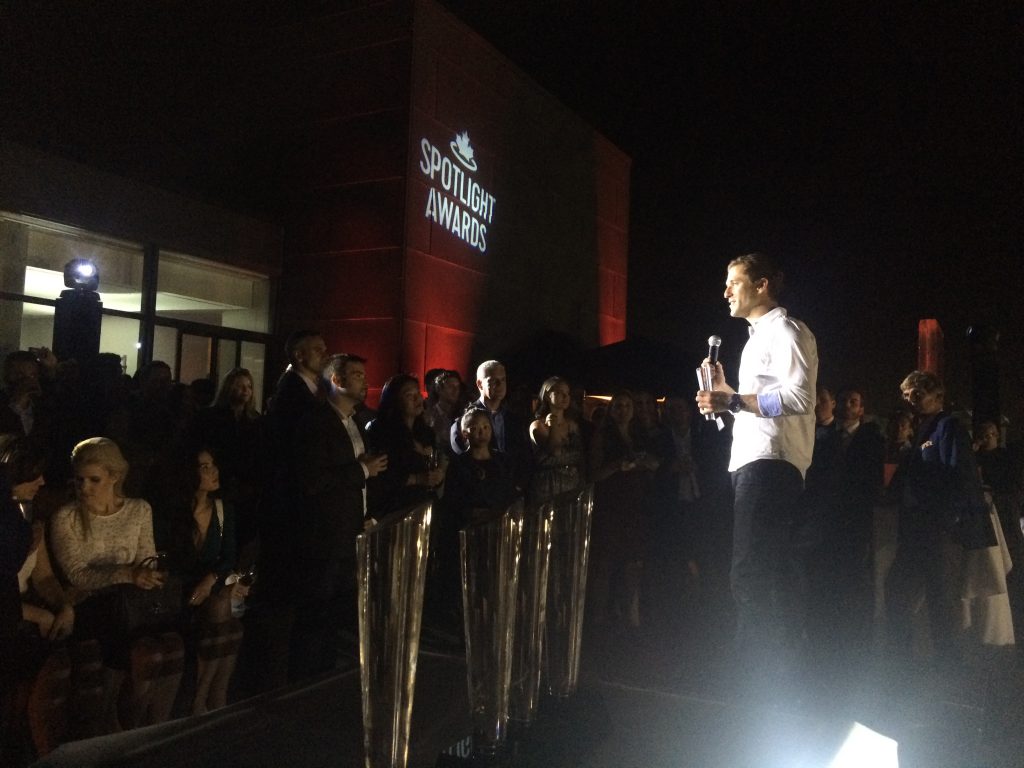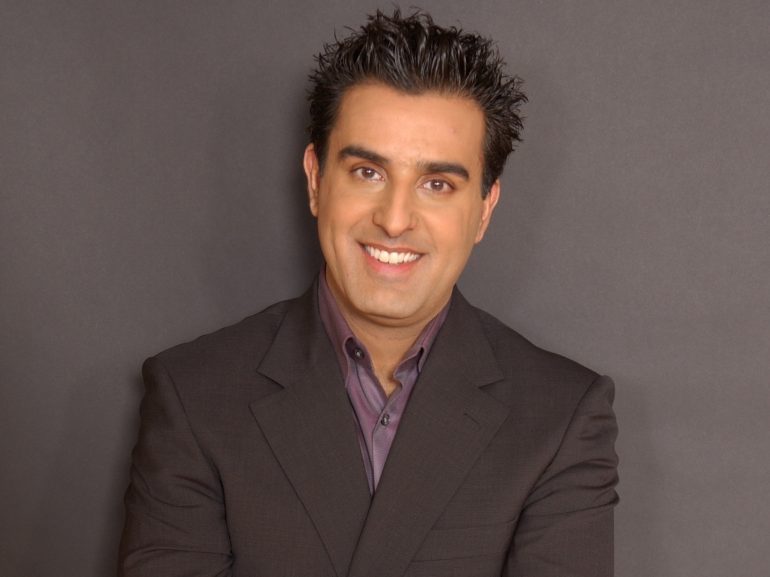Many Canadian entrepreneurs have left the homeland in favour of the opportunities provided by Silicon Valley, but few have come back. Following his $110 million USD exit after the acquisition of Achievers, Razor Suleman came back home, dedicating the last year to promoting and building the Canadian tech ecosystem.
Just two weeks away from his Spotlight Awards gala, BetaKit sat down with Suleman to understand why this entrepreneur is “Canadian by choice.”
How did it come to pass that you threw a gala event for 200 people in your home last year? I’m not sure people really know the origin story of that.
Last year when we had sold Achievers and were moving back to Canada, there was lots of excitement around returning home, and how much the tech community had evolved when we left six years prior to go to Silicon Valley. But one thing that hadn’t changed was the lack of waving the Canadian flag.
There were eight companies last year that we had found out that had significant exits, and nobody was talking about them. Nobody even within the insiders of the community even had an idea – so we were going to solve that problem.
We’re going to bring all the winners together, and we’re going to bring the influencers of the community, the people that really do care about building the Canadian tech ecosystem, and we’re going to put these people onstage and we’re going to profile them and tell their story, and we’re going to get the next generation of young Canadian entrepreneurs who are on track to building great companies to realize that you can do it at home – you are not that different from some of the winners that were where you were five years ago.
So we wanted to celebrate the amazing Canadian entrepreneurs that have created valuable companies, and we wanted to inspire the next generation of entrepreneurs who were on that track.
So you left and came back. Why was that important to you?
“At this moment, this time, Canada is a great place to build a globally scalable tech company.”
– Razor Suleman
We left in 2010, after raising our $25 million Series C from Sequoia Capital, who was very much interested in us coming down and starting a presence in California, which for the business was the right call because there wasn’t really the sales and marketing talent that had scaled organizations locally. So we kept the headquarters and most of the company here, and moved down to scale this thing up globally.
We did that over the five-year period, and once the acquisition happened and we actually had the choice – we had a son who was American, we now had a social network, we had a great home there – when my wife and I thought about where we wanted to raise our son and what community we wanted to be a part of, help build, and give back to, it was a dinner conversation. We bought a one-way ticket back to Toronto and have never looked back.
It was one of the best decisions; we’re Canadian by choice.
Do you think that, for those next-generation founders you’re trying to appeal to, that is a novel idea for them to hear? That part of the lack of awareness is a lack of belief in the type of things you’re trying to promote?
When I was building Achievers, you were always told that there was going to be limitations, and where we are now compared to 2008 is vastly different. We had eight amazing exits last year, twelve this year – all of these companies have great scalable talent. So I totally believe you can build a ‘made in Canada’, enduring unicorn Canadian success story, Canadian-financed, with leaders here. I truly believe that.
Now, I also do believe that you should be a regular visitor to the Valley, but in terms of keeping your team and company and growing and scaling in Canada, that’s our new world. I don’t think it has always been true, but I think at this moment, this time, Canada is a great place to build a globally scalable tech company.

How important is it for young Canadian founders to have previous generations as mentors to look up to? Who did you have to help you through things, or even to just see them go through it, so you know that you could do it?
I always say I’m a product of great mentors. But I’m really aggressive about finding people that are smarter than me and have much more success, and making them my best friends and not being afraid to ask them the tough questions on what I’m struggling with. It’s really lonely being the founder trying to scale a business, so I think mentors are essential, and I think for the most part, if you reach out to the right ones that could be helpful and have a connection, there is this reciprocity. Because anybody that’s gotten to that level of success that could be a mentor, I promise you, has a dozen people that helped them get there, and it’s now their obligation to help the next generation of Canadians.
But I also think there are other ways of getting mentorship. Ben Baldwin just launched Founder City with over 100 founders, all going through that same journey. I’ve been a member of YPO for a long time – I spent a lot of time at my San Francisco chapter. So joining a peer group like Founder City or YPO is essential for anyone growing anyone building a growing scaling company.

Does that relate in some way with the fact that the proceeds of The Spotlight Awards go to The Next 36?
Absolutely. Think about the journey of entrepreneurship. The Next 36’s marquee program is one that’s around founder development, it’s around education – bringing young entrepreneurs from across the country to Toronto. Starting you off on your entrepreneurial journey.
Think about the other end of the spectrum with the Spotlight Awards, and you’re either Tobi from Shopify or you’re Tony Lacavera from Wind, you’ve created a billion dollars plus in value. So we’re really trying to capture the A to Z of the startup journey and look to how we can try to build the pieces in-between so you can do that in Canada. I would love nothing more than to have a Next 36 attendee one year be a Spotlight Award winner five years, ten years down the road.
Which is why we’re doing what we’re doing with the BetaKit Next to identify potential recruits to be future Spotlight Award winners.
Absolutely. For me, it wasn’t until I had gotten to spend time with people that had built big scaling successful companies did I realize that they were similar to me — they had the same challenges, they weren’t that different — but until you get that exposure and that interaction, you can read about them but they kind of feel a little untouchable. But I promise you they’re all cut from the same cloth and getting those BetaKit Next selections in the room are going to give them that opportunity. They’re going to walk around and see people that have created hundreds of millions if not billions of dollars in value.
When we talked at the last Spotlight Awards, we talked about it being a moment, and it seemed like that event even exceeded expectations because of what was going on at that time with Venture North and the people involved. It’s a year later, how are you feeling about the current climate?
You were the first person to ask me that question, and it really did feel like a moment — it was a tipping point, the beginning of something.
In the journey of this past year, I’ve got spend time with the corporate, big bank CEOs, and hear their passion about Canadian tech innovation. I’ve got to spend time with the Prime Minister and the leaders of our government, and they are so excited about this. Obviously, the tech community is, the university and academic community, yet having all of these stakeholders aligned around tech innovation – I’ve never seen it. It’s not a moment, it’s now a movement.
It’s our time for Canadian tech.
Related: Announcing the 2016 Spotlight Awards Winners
BetaKit is the sole media sponsor of the 2016 Spotlight Awards.

